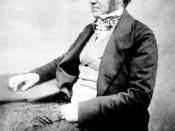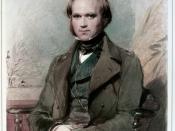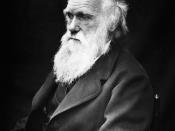An essay on Charles Darwin and his theory of evolution. -
CHARLES DARWIN
Charles Robert Darwin-(1809-1882), was British scientist who made the foundation of modern evolutionary theory with his concept of the development of all forms of life through the process of natural selection. His work was of major impact on the life and earth sciences.
Darwin was born in Shrewsbury, Shropshire, England, on February 12, 1809. Darwin was the fifth child of a wealthy and sophisticated English family. His maternal grandfather was the successful china and pottery entrepreneur Josiah Wedgwood; his paternal grandfather was the well-known 18th-century physician and savant Erasmus Darwin. After graduating from the elite school at Shrewsbury in 1825, young Darwin went to the University of Edinburgh to study medicine. In 1827 he dropped out of medical school and entered the University of Cambridge, in preparation for becoming a clergyman of the Church of England.
There he met two stellar figures: Adam Sedgwick, a geologist, and John Stevens Henslow, a naturalist. Henslow not only helped build Darwin's self-confidence but also taught his student to be a meticulous and painstaking observer of natural phenomena and collector of specimens. After graduating from Cambridge in 1831, the 22-year-old Darwin was taken aboard the English survey ship HMS Beagle, largely on Henslow's recommendation, as an unpaid naturalist on a scientific expedition around the world.
Darwin's job as naturalist aboard the Beagle gave him the opportunity to observe the various geological formations found on different continents and islands along the way, as well as a huge variety of fossils and living organisms. In his geological observations, Darwin was most impressed with the effect that natural forces had on shaping the earth's surface.
At the time, most geologists adhered to the so-called catastrophist theory that the earth had experienced a succession...


